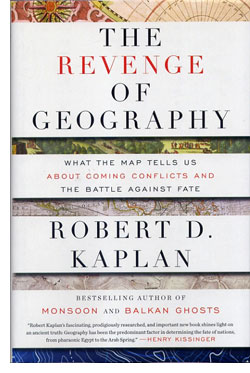 |
 |

Robert D. Kaplan
The Revenge of Geography: What the Map Tells Us About Coming Conflicts and the Battle Against Fate
Random House
US Hardcover First Edition
ISBN 978-1-400-06983-5
Publication Date: 09-11-2012
408 Pages; $28.00
Date Reviewed: 10-04-2012
Reviewed by: Rick Kleffel © 2012
Index:
Non-Fiction
The world is too much with us. Overwhelmed by the minutia of ever-present news, stepping back to see where we've been becomes incomprehensible, even as it becomes ever more indispensible. The instant fix lasts just about an instant — if you're lucky. But Robert D. Kaplan's engaging, intense and compelling book, 'The Revenge of Geography' is a perfect example of how the act of reading induces the necessary state of mind required to achieve any understanding of the increasingly complex historical narrative in which we are enmeshed. Kaplan looks carefully at the past, steadily at the present and offers essential insight about our potential future — or lack thereof.
The premise of the book is captured in the title; the conflicts of this world are shaped by the shape of the world itself. Kaplan's explication of this involves an exploration of geography, history, politics, technology and philosophy. But the book itself is a personal work, based on Kaplan's own realizations and experiences as a foreign correspondent in the Iraq war. Having supported the war going in, he found himself on the ground with a battalion of men making their way across the desert. It was clearly a life-changing moment, and Kaplan lets us follow his journey from the distant past to the near future. Suffice it to say that it's not going to get any easier particularly soon.
Kaplan's book is entertainingly organized and written with a personal through-line; it's Kaplan's journey from time immemorial to a future that's — to be honest — looking pretty bleak. The book is smartly split into two parts, "Visionaries" and "The Early Twenty-First Century Map." The first part looks both history itself and the men who wrote about it, from Herodotus to Marshall Hodgson to Halford J. MacKinder, as the definition of geography itself shifted from a wider focus on the land and those who lived there to maps and mountains.
Kaplan's history and his history of the historians is fascinating and always relevant. He seamlessly weaves in his own experiences and leads us towards the current and future events he discusses in the second part of the book. In "Visionaries," he looks at historic migrations and how the landscape affected them, while simultaneously looking at the works of his predecessors. Combining these with his own experience, he does no less than build this world for the reader, as if it were an alien planet. 'The Revenge of Geography' is an impressive and important work of history.
But Kaplan is not content to discuss just the past. The point of understanding the past, and how it helped to create the present, is to give his readers a deeper understanding of the potential for the future. In "The Early Twenty-First Century Map," he explores the implications of the first part of the book, and builds out the world with a better understanding of how the world itself shapes the civilizations that crawl across it, and the feedback loops that arise between different powers, the places they originate in and the places they migrate to.
Kaplan's prose is a marvel of clarity even as he explores the densest parts of the historical narrative. He maintains a high degree of tension with an expert eye on the present and the future. He's been pretty much everywhere he talks about, and has the sort of personal experience to empower and inform his vision. This is a book that changes the reader by changing their vision of the world. It's very engrossing; hard to put down and hard to forget. It also has a multiplicity of uses. On one hand, it's a book that most who read it will think should be stapled to the foreheads of those who are attempting to run the governments of this world. It's an essential tool for those who live in the world, should they wish to have a clue of what is driving the bigger forces that shape our everyday lives. And it is a book that will be an incredible aid to anyone who wants to write about this world — or any other, in that Kaplan manages a marvelous feat of world-building.
Ultimately, however, what is most interesting about 'The Revenge of Geography' is how much of a book it is. That is, it offers us a reading experience that cannot really be duplicated in any other way. Kaplan's manner of turning the world into words — and then turning those words back into this world — is unique. History is generally thought to refer to the past; but in Kaplan's book, history becomes a clear vision of the present that sets the stage for a visionary exploration of the future.
|
 |
|
|
 |
| |
Review Archive
All Reviews alphabetized by author.
General Fiction
Non-Genre, general fiction and literature.
Horror
Supernatural fiction, supernatural horror and non-supernatural horror.
Science Fiction
Science fiction, science fantasy, speculative fiction, alternate history.
Fantasy
Fantasy, surrealism and magic realism.
Mystery
Crime, thrillers, mystery, suspense.
Non-Fiction
Non-Fiction, True Crime, Forteana, Reference.
Poetry
|
|
 |
|




